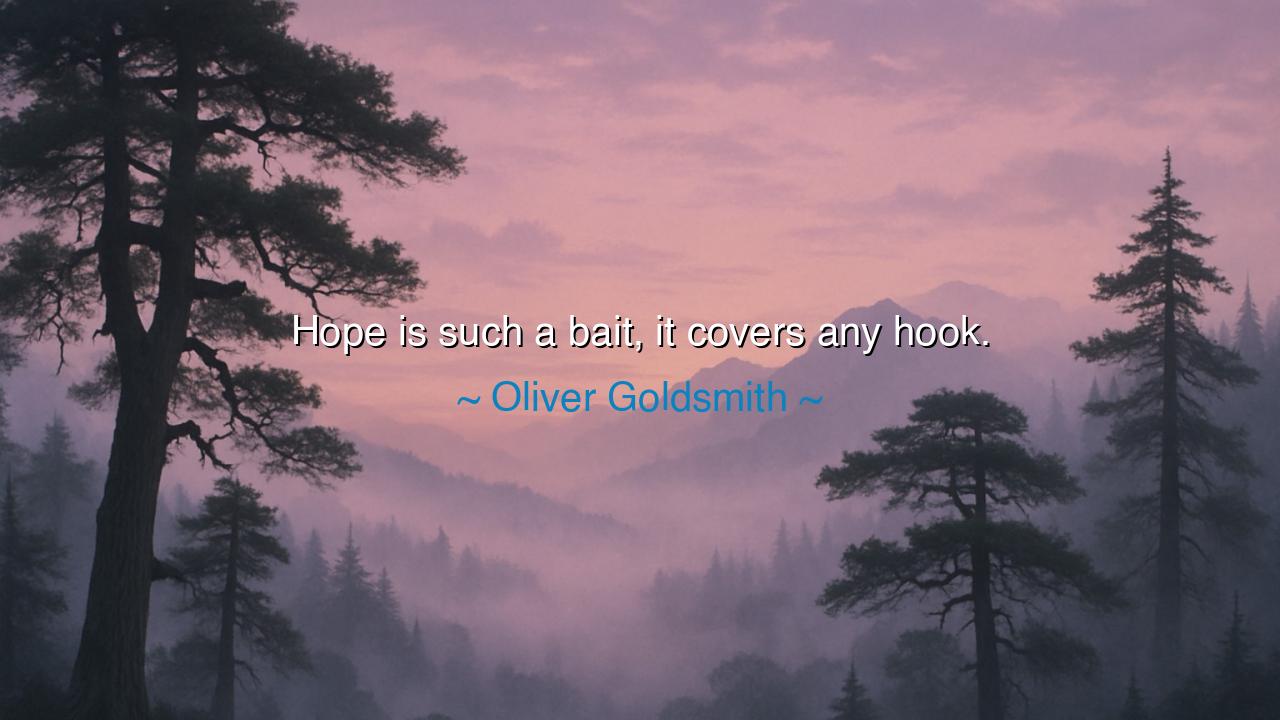
Hope is such a bait, it covers any hook.






The words of Oliver Goldsmith—“Hope is such a bait, it covers any hook”—echo like the voice of a poet who has looked deeply into the human heart and seen both its beauty and its blindness. In this brief yet piercing line, Goldsmith captures the eternal tension between desire and deception, between the dream that uplifts us and the illusion that ensnares us. He reminds us that hope, though radiant and divine in essence, can also be the very lure that leads us toward ruin when not tempered by wisdom. It is both our compass and our snare, both light and shadow.
To understand this saying, one must first grasp the power of hope—that invisible current which drives humankind through hardship, war, love, and loss. Hope has built civilizations, sustained faith, and given courage to the dying. It is the sacred ember that refuses to go out, even in the darkest night. Yet Goldsmith, with the vision of a philosopher, warns us: this same sacred ember can burn the hand that holds it too tightly. Like a bait cast into deep waters, hope draws us forward, urging us to bite, to believe, to reach for what we most desire—yet sometimes what it conceals is a hook, sharp and unseen, ready to bind us to our own folly.
In the old myths of Greece, the gods themselves tested mankind through hope. When Pandora opened her forbidden jar and unleashed sorrow upon the world, only one spirit remained within—Hope. The ancients have long debated whether this was a blessing or a cruelty. For though it softened despair, it also prolonged it; it gave mortals the strength to endure, but sometimes to endure in vain. Thus Goldsmith’s wisdom stands among the ancients: he warns that hope, though divine, can also be the tool of self-deception, covering every danger with the sweetness of its promise.
History itself bears witness to this truth. Consider the tale of Ponce de León, who sailed across oceans in search of the Fountain of Youth. His heart burned with hope—hope of conquering death, of finding the water that would restore all life. But the fountain did not exist; the promise was a bait, and the sea claimed him before his dream was fulfilled. Yet was he a fool? Or simply human—drawn forward by the irresistible pull of hope’s shining illusion? Perhaps both. For without that same hope, no voyage would ever begin; and yet, because of it, many are lost.
Goldsmith’s words are not meant to destroy hope but to discipline it. The wise do not cast away hope—they purify it. They learn to see the hook beneath the bait, to question every promise that glitters too brightly, and to follow not blind optimism, but hope strengthened by reason. True hope is not the naive longing for comfort, but the steadfast faith that endures even when one knows the cost. The fool is led by hope; the wise are guided by it.
Think of Abraham Lincoln, who in the darkest days of civil war still held hope for the unity of his nation. Yet his hope was not a dream of ease—it was a burden borne with sacrifice. He saw the hook—the suffering, the blood, the heartbreak—and still he bit down upon the bait, not from illusion, but from conviction. His hope was not deception; it was duty. In him, we see the transformation of hope from weakness to strength, from temptation to purpose.
So let this teaching be handed to those who walk the uncertain roads of life: be wary of easy hopes. When something promises much and demands nothing, when it glows too brightly and sings too sweetly, pause and look beneath the surface. Ask: what is the cost? What lies hidden behind this shining promise? The wise fisherman knows that the most tempting bait hides the sharpest steel.
Yet do not cast aside hope, for it is also the flame of creation. Rather, learn to master it—to see clearly without ceasing to dream, to hope bravely but not blindly. As Goldsmith reminds us, the world is full of hooks dressed in golden bait. But those who walk with discernment, who temper their faith with understanding, will find not ruin but wisdom. For in the end, it is not the bait that defines us—but whether we choose to bite, or to see.






AAdministratorAdministrator
Welcome, honored guests. Please leave a comment, we will respond soon